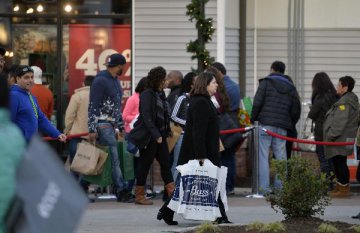Retail sales in the popular pre-Christmas period in December suffered a near 1 percent fall, according to data on Friday, as Brexit worries weighed on consumers' decisions to spend.
December's retail sales figures fell 0.9 percent on November's figures, according to the Office for National Statistics (ONS), the official data body.
The strength of November's figures was caused by a boost from the new retail phenomena of Black Friday, where retailers offer discounts for Christmas purchases, and this was absent from the December figures.
The main driver of the fall in sales volumes in December was a 2.3 percent month-on-month drop in non-food sales.
"There has certainly been some sort of Brexit effect," Thomas Pugh, British economist at Capital Economics, a London-based financial analysis firm, told Xinhua.
"It's pretty difficult to tease out what is down to Brexit, what is down to the slowdown in the global economy and stock market, but based on comparisons with the unemployment rate and inflation I think there is some sort of Brexit effect going on," Pugh added.
Consumer confidence was at its lowest level in December for five years, yet employment is at a record high, unemployment is at a low not seen since the 1970s and wage growth has overtaken inflation.
Pugh said: "In the latest figures, if consumer confidence was where it should be given what inflation and employment are then retail sales growth could be as much as 2 percent higher in December."
Pugh said the Brexit effect had been getting worse over the quarter.
However, the potential for growth is pent-up rather than lost. Consumer spending that could have taken place in December likely to be freed to an extent when a decision is made on Brexit and consumers feel more relaxed about spending, Pugh said.
"While Brexit uncertainty is ongoing sales are likely to remain subdued but once we have clarity on Brexit consumers will start spending again and in our forecast rises rapidly towards the end of the year and into 2020," Pugh said.
December's retail sales figures fell 0.9 percent on November's figures, according to the Office for National Statistics (ONS), the official data body.
The strength of November's figures was caused by a boost from the new retail phenomena of Black Friday, where retailers offer discounts for Christmas purchases, and this was absent from the December figures.
The main driver of the fall in sales volumes in December was a 2.3 percent month-on-month drop in non-food sales.
"There has certainly been some sort of Brexit effect," Thomas Pugh, British economist at Capital Economics, a London-based financial analysis firm, told Xinhua.
"It's pretty difficult to tease out what is down to Brexit, what is down to the slowdown in the global economy and stock market, but based on comparisons with the unemployment rate and inflation I think there is some sort of Brexit effect going on," Pugh added.
Consumer confidence was at its lowest level in December for five years, yet employment is at a record high, unemployment is at a low not seen since the 1970s and wage growth has overtaken inflation.
Pugh said: "In the latest figures, if consumer confidence was where it should be given what inflation and employment are then retail sales growth could be as much as 2 percent higher in December."
Pugh said the Brexit effect had been getting worse over the quarter.
However, the potential for growth is pent-up rather than lost. Consumer spending that could have taken place in December likely to be freed to an extent when a decision is made on Brexit and consumers feel more relaxed about spending, Pugh said.
"While Brexit uncertainty is ongoing sales are likely to remain subdued but once we have clarity on Brexit consumers will start spending again and in our forecast rises rapidly towards the end of the year and into 2020," Pugh said.























Latest comments